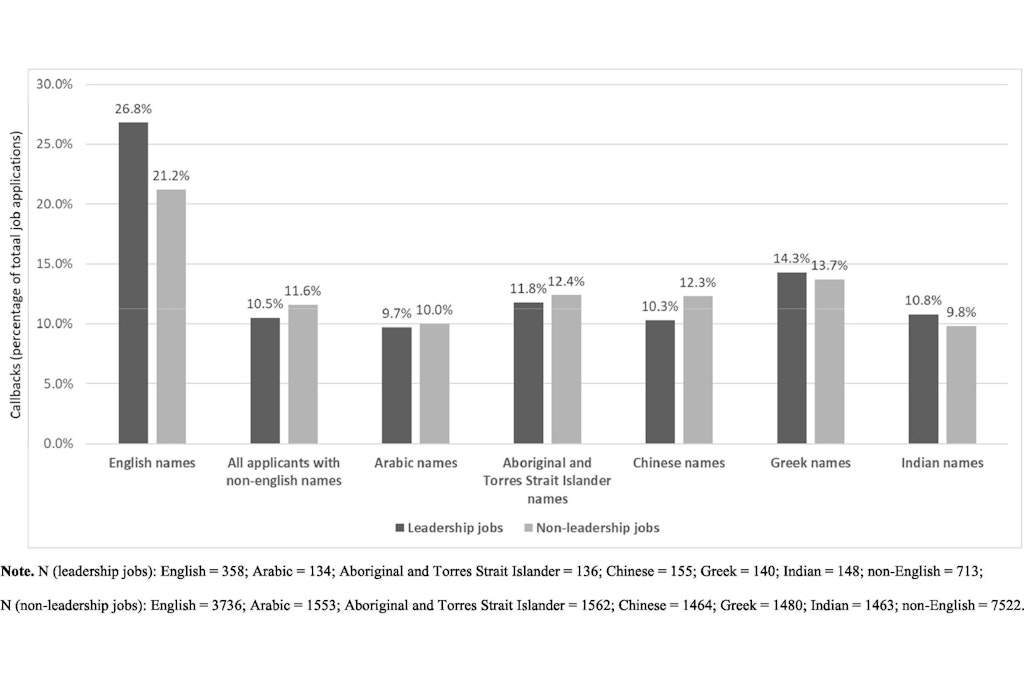Playing it safe: study finds recruiters shy away from ethnic minorities as leaders
Published on 6 July 2023 (Last updated on 24 October 2023)

Research from the Monash Business School shows that glass ceilings exist and discrimination against six ethnic groups for leadership positions is particularly pronounced when recruiting.
Lead researcher Professor Andreas Liebbrandt of the Department of Economics at Monash Business School said it is the first ever study that examines the issue amongst leadership.
How was the study conducted?
- Over 12,000 applications were made to apply for more than 4,000 job advertisements
- Jobs included both leadership and non-leadership positions
- Each job received three identical resumes; one with an English name and two with non-English names (either Aboriginal and Torres Strait Islander, Arabic, Chinese, English, Greek or Indian)
- All candidates were born in Australia, worked in Australia, went to an Australian school or university and had the required qualifications for the job
Despite providing identical resumes featuring qualified applicants, the results from Is there a glass ceiling for ethnic minorities to enter leadership positions? Evidence from a field experiment with over 12,000 job applications showed ethnic minorities received 57.4% fewer call backs than English applicants for leadership positions.
The figure was significantly higher for leadership positions than for non-leadership positions where non-English names still received 45.3% fewer call backs than English names.
Overall, Arabic names received the lowest number of call backs for leadership positions (9.7%), while Greek names were the most successful non-English demographic (14.3%).
“Their decision-making could also be influenced by stereotypes and general leadership prototypes so that they would prefer applicants with English names for leadership positions,” Professor Liebbrandt said.

“This is consistent with Implicit Leadership Theory where recruiters focus on an ideal or typical leader that is likely to be successful in different contexts and refers to a general knowledge structure of typical leadership; if a leader’s characteristic matches a leadership prototype, a leader is evaluated as being a typical leader.”
As part of the research, there was a clear focus on key traits in leadership and non-leadership positions, such as customer contact, individualism, creativity, innovation and learning. Twelve occupations were included in the study, such as accounting, human resource management and personal care assistant.
By looking at a cross-section of those traits and occupations, the researchers found customer contact did influence positive responses for leadership positions; applicants with English names received 19.5% more positive responses when direct customer engagement was involved in the job description.
One hypothesis is the belief that Australian recruiters believe Australian companies need a leader who matches the general leadership prototype. According to past research by Diversity Australia, roughly 95% of Australia’s most senior roles are filled by people with either an Anglo-Celtic or European background. Therefore, going against the grain could be perceived as detrimental.
In addition, it appears decision-making could be influenced by stereotypes based purely on a name – and not upbringing – indicating ethnic discrimination has not been removed from the workplace despite concerted efforts to increase diversity.
“While many organisations have successfully implemented diversity practices across the board they should also think about the context of leadership to increase the number of underrepresented groups in leadership positions,” Professor Leibbrandt said.
To deter future bias, Professor Liebbrandt suggested using anonymous job applications during the first stage of the recruitment process to remove upfront bias. Meanwhile, he said recruiters could undergo further training to reduce ethnic discrimination and strengthen understanding of culturally endorsed leadership prototypes.